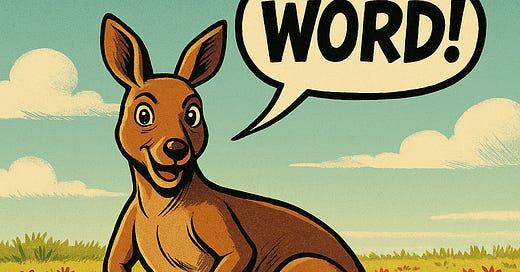Some words are embedded right there inside other words, just like the word bed in embedded.
Linguists call these words nested words or maybe embedded lexemes if they really want to impress someone, but I’ve recently encountered a different term I really like. This term is marsupial words.
Marsupial is a great marsupial word. You’ve got the Roman god of war, Mars, right there at the beginning. That type of kangaroo word (another name for this phenomenon) is the most obvious, where the joey (the word for a baby marsupial) is right there in plain sight, embedded in the mother.
There’s also mar (to damage or to spoil), up, pi, and sup (to eat dinner). One marsupial word embedded in marsupial is a real joey: the word marsupia is the plural form of the word marsupium, which means pouch.
So, yeah: marsupia is a marsupial word embedded in marsupial itself.
If you’ve ever done any word circle puzzles, you already know this game well. Recreational linguists like me nerd out over word origins and the way language evolved by writing essays like these, but you can get a really good idea of this nesting phenomenon simply by locating hidden words.
This all touches on the way words themselves come to be. If you can identify a kernel word that’s embedded in a larger word, there’s a good chance you have a piece of that larger word’s origin story. This is easiest to see with prefixes and suffixes, like the word ease being nested in the word disease, or in words like understand.
You can also see much deeper linguistic fossil trails, especially if a word has come about thanks to an older form that you can still see. Nostalgia is a great example: algia is from the ancient Greek algos, which means pain; nostos means “to return.” Put them together, and you have the pain of returning home.
This is neither here nor there, but there is an interesting type of marsupial word, containing the word here. Both words trace back to their proto-Germanic roots, where both evolved at the same time, like a yin and yang for describing locations.
On the other hand, sometimes a combination of letters inside a word is just that.
The word plant doesn’t have anything to do with the word ant, for instance. Ant is still the joey to plant’s mother, but unlike those other words that give us a clue as to where they came from, these are linguistic pretend-friends.
Feature has nothing to do with eat, although it’s right there. Similarly, we have start and art; person and son; alone and one; and so on.
Sometimes, a word is like a kernel where other words can build from it. This is like Young Andrew, still at my core, still wanting to explore and break things. Young Andrew needs to add layers over the years to become me, and these kernel words add suffixes or other words to shape them into something new, but with a vestige of what that word used to be.
Other times, what you’re seeing is not a kernel at all, but instead a coincidence, like the word coin being at the beginning of coincidence.







Wait...so plants AREN'T just ANTS that PLayfully stand really, really still? What are we even doing with our biological naming conventions, then?!
Also, I see you're making good use of 4o's comic and text abilities now - nice!
Hhhmm. So would transport be a nesting word for transportation? I love the article but trying to figure this nesting thing out.